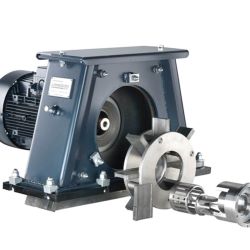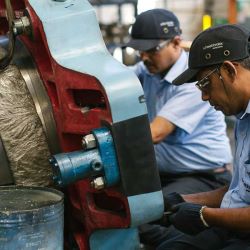Marcell Knoch, Project Lead for the new production line at Fritz Winter, explains: “We make crank cases for big car manufacturers - quality, efficiency and on-time delivery is paramount to us. That’s why, once again, we went with Wheelabrator blast machines for our completely new production line. The Wheelabrator team delivered the project quickly and on time; the quality and performance of the machines, particularly in terms of throughput, ease of maintenance and blast results, are excellent.”
Challenge
The family-owned company, based in Germany, has added the new production line in response to high demand from the car industry. Installed in summer 2015, the two Wheelabrator Manipulator DS1-650 FE/D machines fit in perfectly with the new line, which runs from furnace through to packaging and shipping.
Equipped with six U70x500 blast wheels each, the two new blast machines desand and decore up to 120 crank cases per hour each (with manipulator double-loaded), in 17 shifts per week, which adds up to a total annual production of around 1.6 million.
Solution
The manipulator machine concept has proven popular due to its flexibility and performance. It allows the internal and external blasting of complex parts of varying shapes and sizes, at a high degree of automation and with fast cycle times. The newly installed equipment at Fritz Winter achieves a cycle time of 60 seconds.
Loading, emptying (removal of abrasive) and unloading of parts happens smoothly and is fully automated.
Industrial robots place workpieces on the manipulator and remove them again after processing. The loading area is also used to empty the crank cases after blasting and ensure virtually no abrasive is left inside internal areas of the workpiece, preparing it perfectly for subsequent processes.
The two new blast machines at Fritz Winter can accommodate workpieces of up to 65kg weight and up to 477x406x314mm in size.
Result
Wolfgang Försterling, Concept Engineer at Wheelabrator, comments: “Manipulator blast machines are very popular, particularly in engine production. We can programme different motion sequences for the manipulator (turn, swing, hold, etc), to allow perfect blast coverage of the workpiece from all sides as well as ensure thorough removal of abrasive. This is becoming more and more important as modern engine blocks are becoming more complex, often featuring winding, hard-to-reach cavities.”
In total, eleven Wheelabrator machines are currently operating at Fritz Winter, the oldest since around 1990. As part of strategic equipment modernisation programmes (“EMPs”) they are continuously improved and upgraded with the latest state-of-the-art technology.
View the Wheelabrator Manipulator DS1-650 FE/D machine in action below.


